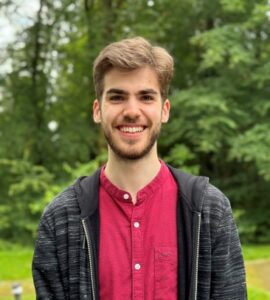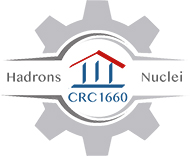 Felix Heim has successfully completed his bachelor thesis studying the feasibility of measuring the photodissociation of 6Li in electron scattering with the A1 spectrometer apparatus at MAMI and was awarded the degree of Bachelor of Science (B.Sc.).
Felix Heim has successfully completed his bachelor thesis studying the feasibility of measuring the photodissociation of 6Li in electron scattering with the A1 spectrometer apparatus at MAMI and was awarded the degree of Bachelor of Science (B.Sc.).
In his thesis he estimated the expected event rate of the reaction 6Li(e, e' α)d using the MAGIX simulation framework and studied the properties of the inevitable background due to the target design using the FLUKA simulation software package.
Congratulations to Felix and all the best for his further studies!

Florian Manderscheid successfully completed his bachelor thesis "Feasibility study of 7Li photodissociation as a probe for the radiative capture reaction 6Li(n,γ)7Li" as well as his final exam and was awarded the title of Bachelor of Science (B.Sc.).
During his time at AG Sfienti, he computed the neutron capture cross section for 6Li and implemented it in the MAGIX simulation framework to estimate the feasibility of such an experiment with MAGIX at MESA and a precursor at A1.
Congratulations!
 The German Research Foundation (DFG) approved the establishment of the CRC 1660 "Hadrons and Nuclei as Discovery Tools" at Johannes Gutenberg Unversity. This newly granted Collaborative Research Centre will allow for an interdisciplinary approach to the search of new physics phenomena, and it will significantly sharpen our understanding of strong interaction processes.
The German Research Foundation (DFG) approved the establishment of the CRC 1660 "Hadrons and Nuclei as Discovery Tools" at Johannes Gutenberg Unversity. This newly granted Collaborative Research Centre will allow for an interdisciplinary approach to the search of new physics phenomena, and it will significantly sharpen our understanding of strong interaction processes.
By bringing together the fields of atomic, nuclear, and hadron physics, this project holds a unique discovery potential along three main research pillars.
In the first pillar, experiments at low energies and high intensities are used to search for new particles (e.g. dark matter particles) and interactions beyond the SM, and the results are interpreted using lattice QCD. The second pillar investigates the interface between hadron and nuclear physics through spectrometry experiments, electron and photon scattering experiments and high-precision calculations that will improve the interpretation of neutrino experiments and the description of muonic atoms. The third pillar focuses on the exploration of nuclear astrophysics and multi-messenger astronomy with a new generation of high-precision experiments in low-energy nuclear physics combined with state-of-the-art theoretical calculations using effective field theories.
The very broad combined expertise in atomic, nuclear and hadronic physics within this CRC will allow for a significant impact on all the above research avenues simultaneously. The outstanding opportunities enabled by the new local MESA accelerator, which is coming online, as well as at the MAMI (Mainz), BESIII (China), and PSI (Switzerland) facilities, combined with the very strong interplay between the theoretical and experimental groups, will foster unique physics and methodological connections between the different research fields and create a favourable environment for discoveries.
For more information, please read the Johannes Gutenberg University's press release.
Personal data is collected when using this form. In addition to the data protection declaration of the JGU, the following data protection information for the contact form for the AG Sfienti must therefore be taken into account:
Description and scope of data processing
On our website, you have the option of using a contact form for enquiries. We need your name and e-mail address to reply to you.
Purpose of data processing
The purpose of collecting the name and e-mail address of the user is to be able to contact him or her to schedule an appointment or to answer the enquiry by e-mail.
Duration of storage
The data is deleted as soon as it is no longer required to achieve the purpose for which it was collected. The data will therefore be stored until all matters relating to the enquiry have been concluded or the user has declared that he or she is no longer interested.
Possibility of objection and removal
The user may withdraw his or her interest in receiving a reply to the enquiry at any time.
Bei der Nutzung dieses Formulars werden personenbezogene Daten erhoben. In Ergänzung zur Datenschutzerklärung der JGU sind daher folgende Datenschutzhinweise für das Kontaktformular für die AG Sfienti zu berücksichtigen:
Beschreibung und Umfang der Datenverarbeitung
Auf unserer Internetseite haben Sie die Möglichkeit für Anfragen ein Kontaktformular zu nutzen. Zur Rückmeldung benötigen wir Ihren Namen und Ihre E-Mail Adresse.
Zweck der Datenverarbeitung
Die Erhebung des Namens und der E-Mail Adresse der Nutzerin oder des Nutzers dient dazu, sie oder ihn zur Planung eines Termins kontaktieren zu können oder die Anfrage per E-Mail zu beantworten.
Dauer der Speicherung
Die Daten werden gelöscht, sobald sie für die Erreichung des Zwecks ihrer Erhebung nicht mehr erforderlich sind. Die Daten werden demnach solange gespeichert, bis alle Belange die Anfrage betreffend abgeschlossen wurden, oder seitens der Nutzerin oder des Nutzers erklärt wurde, dass kein Interesse mehr besteht.
Widerspruchs- und Beseitigungsmöglichkeit
Das Interesse an einer Antwort uaf die Anfrage kann seitens der Nutzerin oder des Nutzers jederzeit widerrufen werden.
Our research projects are funded by:


This is the administration page.
 Felix Heim has successfully completed his bachelor thesis studying the feasibility of measuring the photodissociation of 6Li in electron scattering with the A1 spectrometer apparatus at MAMI and was awarded the degree of Bachelor of Science (B.Sc.).
Felix Heim has successfully completed his bachelor thesis studying the feasibility of measuring the photodissociation of 6Li in electron scattering with the A1 spectrometer apparatus at MAMI and was awarded the degree of Bachelor of Science (B.Sc.).

 The German Research Foundation (DFG) approved the establishment of the CRC 1660 "Hadrons and Nuclei as Discovery Tools" at Johannes Gutenberg Unversity. This newly granted Collaborative Research Centre will allow for an interdisciplinary approach to the search of new physics phenomena, and it will significantly sharpen our understanding of strong interaction processes.
The German Research Foundation (DFG) approved the establishment of the CRC 1660 "Hadrons and Nuclei as Discovery Tools" at Johannes Gutenberg Unversity. This newly granted Collaborative Research Centre will allow for an interdisciplinary approach to the search of new physics phenomena, and it will significantly sharpen our understanding of strong interaction processes.
